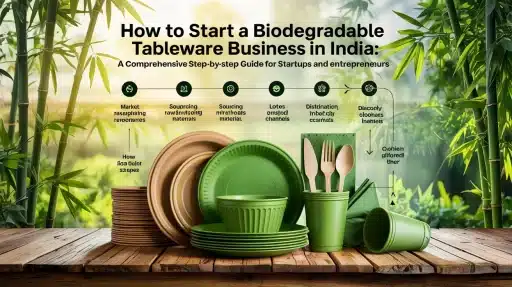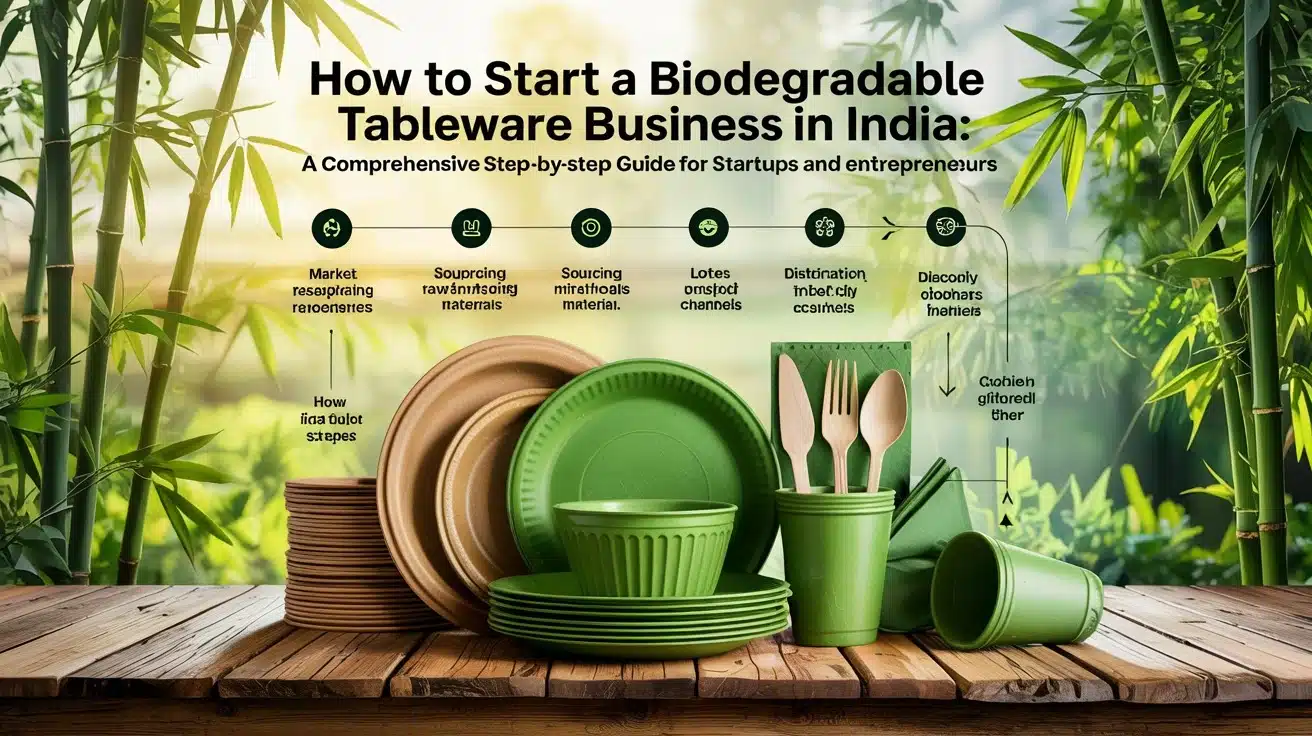Interest in starting a biodegradable tableware business in India creates viable avenues for entrepreneurs wishing to marry profitability with environmental accountability. The Indian government’s initiative to phase out single-use plastics and rising consumer demand for sustainable alternatives stand to grow this line of business in the very near future.
This 5,500-word SEO-friendly guide provides an in-depth road map for startups and entrepreneurs on all the aspects concerning the launch and scale of their business. Market survey to funding options: We will take you, step by step, and show how to utilize Niir Project consultancy Services in an entrepreneur’s endeavor.
Why Start a Biodegradable Tableware Business in India?
In India, more than 26,000 tons of plastic waste are generated every day, most of which reaches landfills or oceans. The amended 2021 Plastic Waste Management Rules ban single-use plastics, offering tremendous business opportunities to biodegradable tableware. Biodegradable tableware can be produced from sugarcane bagasse, bamboo, or cornstarch, and products made from these materials will naturally decompose in nature, making them an environmentally friendly option for the food service industry.
The market potential is enormous. Future Market Insights reports that the global bagasse tableware market is projected to grow at a CAGR of 6.8 percent during 2021-31, in which India has become the next big player. So, for the startups and entrepreneurs, now is a chance to enter a very lucrative niche and contribute to a greener planet.
In this guide, five important steps required to step in the business of biodegradable tableware have been discussed. They are:
- Research and Ideation: In this step, one identifies the market needs and the pain points of customers.
- Manufacturing Unit Setup: Location selection, land acquisition, and machinery installation.
- Licensing and Certification: Obtaining environmental and quality certifications.
- Marketing Strategies: Digital and B2B marketing strategies.
- Funding Options: Grants from the government, venture capitals, and green loans.
There we go!!
1. Research and Ideation: Understanding Market Needs and Customer Pain Points
Before wasting your precious time and money, one should conduct exhaustive market research to find out whether the market for biodegradable tableware actually requires such a business. This is done by gathering customer needs, analyzing what competitors offer, and finding opportunities for invention.
1.1 Market Research: Importance
Market research helps you prove the idea behind your business and customize the product according to the customers’ requirements. The need for biodegradable tableware in India arises from:
- Government Regulation: Use of single-use plastic has been restricted, and businesses are now looking for its alternatives.
- Consumer Awareness: With growing awareness among the urban population regarding the environment.
- Industry Requirements: Affordable, durable, and eco-friendly tableware to restaurants, caterers, and event planners.
As a matter of fact, a survey conducted by Statista in 2022, 68% of Indian consumers will pay extra for sustainable products. Clearly, this trend is an eye-opener for biodegradable tableware start-ups.
1.2 Identifying Customer Pain Points
Act on the challenges that your target customers are suffering:
- Environmental Impact: Pollution of environment due to plastic waste; hence, demand for compostable alternatives.
- Cost Concerns: Biodegradable products considered expensive compared to plastic by many.
- Durability: Customers are concerned about the strength and utility of eco-friendly tableware.
- Availability: Limited supply in rural or semi-urban areas creates space for you to operate.
With these points of pain addressed–with cheap, good quality, and accessible biodegradable tableware–you can target your prospects and create a market niche.
1.3 Market Research
How to gather insights to provoke action:
- Surveys and Interviews: Fine study of prospective customers like restaurant owners, caterers, and households to find their preferences.
- Competitor Analysis: Analyzing other players in the market such as CHUK (by Pakka Limited) or EcoWare will help you to identify gaps in their offerings with respect to pricing, product variety, etc.
- Industry Reports: Trustworthy sources will provide data that can help you analyze the market size and growth trend.
In this regard, www.niir.org is a great help. They will provide you with a detailed market research report, feasibility report, and industry analysis specific to biodegradable tableware in India. Using this insight, you can determine regions in high demand, popular materials, and upcoming trends.
1.4 Ideation: Finding Your Unique Selling Proposition (USP)
The example needs to be further explained:;
- Innovative Materials: For use sourcing unique, locally made articles from such local materials as areca leaves or wheat straw.
- Low-Cost Price: Compete in price with other players with very low rates to address cost-sensitive markets.
- Customizing: Creating branded tableware for an event or business.
Takeaway: Urban focus-Delhi, Mumbai, and Bangalore-cities whose populous nature leads to maximum demand for sustainable tableware.
2. Manufacturing Unit Setup: Choosing Location, Acquiring Land, and Installing Machinery
Once you have validated your idea, the next step is to set up a manufacturing unit. The location, land acquisition, and installation of the right machinery have accrued under this approach.
2.1. Selecting the Location:
The selected site becomes a part of the cost incurred in production and logistics, as well as market reach. Factors contributing to a good location are:
- Location near Raw Materials: For example, use of sugarcane bagasse would require the location near sugar mills in Uttar Pradesh or Maharashtra.
- Market Access: Nearer to urban centers, less distance has to be traveled for transporting goods to restaurants and retailers.
- Infrastructure: Need reliable electricity, water, and road connectivity.
Example: Tamil Nadu is great for sourcing bamboo and bagasse as it has the base for agriculture and industrial hubs, and it will be served by south markets.
2.2 Acquiring Land and Setting Up the Facility
The size of your unit depends on your production goals:
- Small-Scale: 500–1,000 sq. ft. for 5,000–10,000 units/month.
- Medium-Scale: 2,000–5,000 sq. ft. for 50,000+ units/month.
Key steps:
- Land Purchase/Leasing: Check zoning laws to ensure industrial use is permitted.
- Facility Design: Plan separate zones for raw material storage, production, and packaging.
- Environmental Compliance: Adhere to local regulations for waste management and emissions.
NPCS offers project reports with facility layout suggestions, cost estimates, and compliance guidelines, making this process smoother.
2.3 Installing Machinery
Machinery varies based on your chosen material:
- Sugarcane Bagasse: Pulping machines, molding presses, drying systems.
- Bamboo: Cutting machines, shaping tools, finishing equipment.
- Cornstarch: Extruders, molders, and drying ovens.
A small-scale bagasse unit might cost ₹10–15 lakhs, including:
- Pulping Machine: ₹3–5 lakhs
- Molding Machine: ₹5–7 lakhs
- Drying Equipment: ₹2–3 lakhs
Niir Project Consultancy Services provides a detailed list of suppliers, machinery specifications, and installation advice in their biodegradable tableware project reports.
2.4 Sourcing Raw Materials
Partner with local suppliers:
- Bagasse: Sugar mills (e.g., in Uttar Pradesh or Karnataka).
- Bamboo: Northeast India or rural cooperatives.
- Cornstarch: Agricultural processors in Punjab or Gujarat.
Pro Tip: Negotiate long-term contracts to stabilize costs and ensure a steady supply.
3. Licensing and Certification: Obtaining Environmental and Quality Certifications
Following legal and environmental standards will gain the customer trust, for the smooth operational development of your biodegradable tableware business.
3.1 Basic Licenses
- You will need: Business Registration: Sole Proprietorship, Partnership, or Private Limited Company Registration under the Ministry of Corporate Affairs.
- GST Registration: This is mandatory for taxation if one’s turnover goes beyond ₹20 lakhs (₹40 lakhs in some states).
- Trade License: Issued at the municipality.
- Factory License: Licenses for factories and manufacturing units under the Factories Act, 1948 fall under this requirement.
MSME registration is optional, but will help you tap into government benefits.
3.2 Environmental and Quality Certifications
Certifications used to create credibility:
- ISO 9001: Standard for a quality management system.
- ASTM D6400/EN 13432: Confirm compostability.
- CPCB Certification: Required for compostable plastics under the Plastic Waste Management Rules.
The process involves product sample submissions to accredited labs (e.g. CIPET) after fee payment (₹ 50,000-1 lakh). Consultancy (for both documentation and lab recommendations) services are found on www.niir.org.
3.3 Legal Compliance
Keep abreast of:
- Plastic Ban Rules: These rules are enforced by the pollution control boards of the states.
- Waste Management: Proper disposal of the waste of production should be done.
- Actionable Tip: Hire a local consultant or depend on www.niir.org expertise to quickly get those approvals because delays can kill your launch. 4.Marketing Strategies: Focusing on Digital Marketing and B2B Sales
Your training goes to date October 2023. The importance of effective marketing strategies to reach customers and bring your brand to life in the competition-ridden industry of biodegradable tableware.
4.1 Digital Marketing Techniques
Use online channels to your advantage:
- SEO: Optimize in keywords like “biodegradable tableware India,” ‘eco-friendly plates, and “sustainable dining solutions” for your website.
- Content Marketing: Create and publish blogs (for example “Top 5 Benefits of Biodegradable Tableware”) and product promotion videos.
- Through social media: Instagram can give an eye to the product, while LinkedIn can generate revenue through B2B marketing.
For example, a blog optimized for the keyword “buy biodegradable tableware online” can get organic traffic to the e-commerce website.
4.2. B2B Sales Strategies
Business opportunities can include:
- Restaurants and Cafes-Bulk price and discount with samples
- Event Planners-Promote for custom tableware for weddings or corporate parties
- Retailers-Find eco-friendly stores or supermarkets to partner with.
Participate in trade shows such as the India Food Forum to meet the buyers. You can connect through www.niir.org to industry events and marketing consulting.
4.3. Brand Presence
Be unique because of:
- Sustainability Messaging: State your environmental advantages (e.g., “100% compostable in 90 days”).
- Eco-Friendly Packaging: Do not use excess materials for packaging that are recyclable.
- Certifications: Have product ISO or CPCB logos.
Insight: Give local businesses free samples to create goodwill and grab that initial order.
-
Funding Options: Exploring Government Grants, Venture Capital, and Green Loans
Securing capital is the first step towards starting your biodegradable tableware business. The best options to consider are:
5.1 Government Grants and Subsidies
There is government support for sustainable business initiatives in India:
- PMEGP: It Provides grants of up to ₹25 lakhs for new units with a 15–35% subsidy.
- MSME Schemes: Low-interest loans and technical assistance.
- State Incentives: Maharashtra and Gujarat provide tax breaks for green businesses.
Apply through the MSME portal or the state industrial departments. www.niir.org details these schemes in their funding guides.
5.2 Venture Capital and Angel Investors
Investors like eco-friendly start-ups:
- Pitch Deck: It must feature the market potential, the USP and the financial projections.
- Key Players: Companies like Omnivore or angel networks like Indian Angel Network fund sustainability projects.
A good business plan is critical-and project reports from www.niir.org can guide your business plan.
5.3 Green Loans and Alternatives
Check Out:
- Green Loans: Banks like SBI provide funding for environmentally friendly projects.
- Crowdfunding: Like Ketto, where one can attempt to gauge interest by raising ₹5–10 lakhs.
- Partnerships: With high food service entities for joint financing.
Actionable Tip: Initiate with MSME subsidies for low-risk funding and pitch to investors as you scale up.
How www.niir.org Supports Entrepreneurs
www.niir.org is a one-stop platform for startups:
- Project Reports: Designed as guidebooks, they cover costs, machinery, and market trends in detail.
- Consultancy: Rendering opinion in lieu of setting up activities, compliance with laws, and marketing.
- Market Insights: Providing data to allow you to improve your strategy. Funding Assistance: Information on grants and loans.
For more of these resources, visit Niir project consultancy services and fast-track your success.
Conclusion
Setting up a biodegradable tableware business in India means entering into entrepreneurship while also doing something good for the environment. With this guide – market research, factory set-up, licensing, marketing, and funding – you are adequately poised for success.
So, when do you intend to begin? Contact Us for expert assistance and take the first step toward a greener future.






